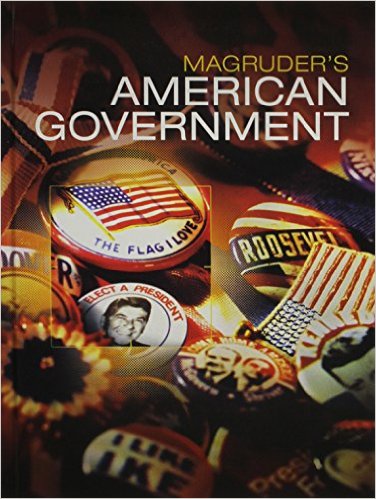
Magruder’s American Government
1st Edition
ISBN: 9780133306996
Textbook solutions
All Solutions
Section 5-4: The President’s Foreign Affairs Powers
Exercise 1
Step 1
1 of 3
Treaties are considered acts of Congress that are enforceable by the federal law. Treaties can be proposed by the president, but have to be approved by Congress.
Step 2
2 of 3
There are few way to change or terminate the treaties. Treaties are repealed when the new law, which is contrary to the treaty, is passed. A treaty that is found to be unconstitutional can be repealed or modified to be under the Constitution. The executive council can also amend treaties to enforce the new proposition under the treaty.
Result
3 of 3
The president can either request the **amendment** of a treaty or **termination** of a treaty. The termination and amendment of the treaty to be in effect **needs the consent of Congress**.
Exercise 2
Step 1
1 of 2
The United States intended to build a canal in Panama, but Colombia was getting in the way. When Panama’s rebellion against Columbia was undergoing, the **States encouraged Panama by giving them recognition because they made a deal with them to make the Panama canal**. Therefore, the recognition of Panama was a political move by the U.S. to obtain a permission to build the canal because it would economically benefit the States. The canal would offer the States with accessible transportation between the coasts.
Result
2 of 2
**When President Roosevelt gave Panama recognition**, it was to favor Panama in revolt against Columbia **out of political interest** in obtaining permission for building the Panama canal. Before that, the Columbians were getting in the way of making the canal, and Panama was willing to make the deal of making it.
Exercise 3
Step 1
1 of 4
When President Roosevelt stated to speak softly and carry a big stick, the intention was to let everyone know that if **diplomacy does not work to make political matters right, force shall be used**.
Step 2
2 of 4
The statements go hand-in-hand with Roosevelt’s beliefs in the Stewardship Presidency. To do whatever is necessary to achieve the goals for the prosperity and security of the U.S.
Step 3
3 of 4
In today’s world, the globe is full of threats. For the **States to stay safe and make beneficial political moves, there has to be an army behind** it if the diplomacy does not resolve the situation.
Step 4
4 of 4
Imagine if the States had no armed forces or no presidents who enforced protection and were only soft-spoken. Some countries would probably already overtake the United States and apply its own rules. President Roosevelt knew this and acted in such a manner.
Exercise 4
Step 1
1 of 3
The **War Power resolutions** demanded that the military actions have to be approved by Congress. The **extra time consumption of decisions passing through the Congress’s approval can be detrimental to the States** in emergencies or when immediate measures are necessary. Knowing the downside of the War Resolution, President Nixon vetoed the act. Nixon also gave few examples of the military responses that would not be as successful if the War Power Act was enacted.
Step 2
2 of 3
Keeping the system in check, President Nixon took the initiative and vetoed Congress’s resolution. Nixon supported the idea of the Stewardship presidency and believed that the chief commander should take the lead in an emergency situation due to the lack of Congress’s knowledge in global affairs.
Result
3 of 3
**President Nixon gives examples to support the veto act** by outlining that the outcome in the given examples would not be as favorable to the U.S. due to slower reaction time if the War Power Act were enacted.
Exercise 5
Step 1
1 of 5
The power of the President as the commander in chief gives him control over the actions of the army and navy forces.
Step 2
2 of 5
The framers thought that possible emergencies require immediate actions so the power should reside in one individual rather than the complex system of legislation, as in that way the reaction time is more efficient.
Step 3
3 of 5
The President has to get Congress’s approval over declaring war to make sure the power is not overused. With the President being partly dependent on Congress, it is ensured the power is divided and not put to bad use.
Step 4
4 of 5
Furthermore, the President is the one who represents the states as a whole. The President deals with international business, commerce, and diplomacy. It would only feel right that the President commands the military forces as it is of a foreign nature as well.
Result
5 of 5
Efficient timing is crucial in successfully prevailing emergencies. Therefore, the Framers gave the power over the military forces to the president. **When one individual can make decisions, it is certainly quicker than the legislation making the military decisions.**
unlock

